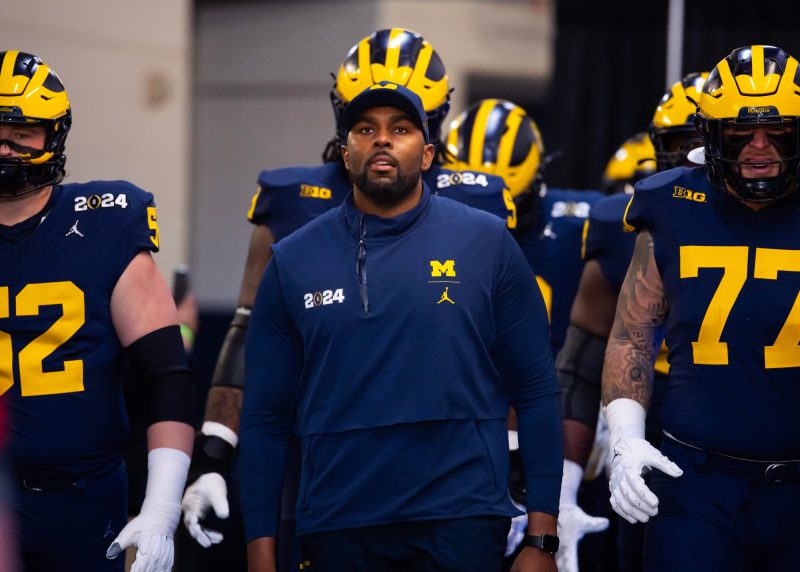From the moment the Michigan sign-stealing scandal spilled into public consciousness roughly 21 months ago, it has served as the ultimate Rorschach test for college sports tribalism, for the pettiness of longstanding rivalries, of our voracity for social media conspiracy theories and how quickly controversy can turn into celebrity.
Just imagine if you had told anyone with a working knowledge of Michigan’s football program August of 2023 that they’d win a national championship and the person who got a Netflix special out of it would be … Connor Stalions? I rest my case.
And now, as Michigan braces for the findings and penalties stemming from its NCAA infractions case on Friday, we will hear all of it again regardless of the outcome: Complaints from Ann Arbor over selective enforcement, complaints from Columbus (and perhaps points beyond) that the NCAA didn’t hit hard enough, half-baked justifications for Stalions’ behavior and eye rolls from the sports nihilists who think all of this is silly because rules were never meant to be followed in the first place.
We undeniably live in a more permissive culture than at any time in NCAA history. The Overton Window on what we consider a college sports scandal changed forever on Nov. 5, 2011 when Jerry Sandusky was arrested are charged with 52 accounts of sexual abuse. Things that used to shock people, like agent involvement in a recruitment or payments to college athletes, no longer registered the same way – and that true even before the NCAA made that stuff legal.
So the impulse now is to shrug our shoulders at all of it. If you don’t like Michigan, you probably want them punished. If you root for Michigan, you probably think this was all a ridiculous witch hunt. And if you have no skin in the game, you probably are just laughing at the NCAA for trying to punish anyone for anything at this point.
But I’ll propose a radical thought here: Maybe, just maybe, the way all of us experience sports would be better if we simply pushed back a little harder on the idea that cheating – even in the ridiculous world of college sports — isn’t a big deal.
A couple months before I ever heard the name Conor Stallions, I was having a phone conversation with Shawn Klein, an Arizona State philosophy professor who has extensively written about and studied ethics in sports. At the time, I was working on a project that became an award-winning 10-part series about the history of cheating in sports, which human beings have grappled with dating back to chariot races in Greek and Roman antiquity.
When I asked Klein why people tended to view cheating in sports differently than, say, cheating on their taxes or cheating on their significant other, his explanation forever changed how I thought about this stuff.
The gist is that while we live in a world of rules that have been put in place to help us make our lives better and organize society, we’d still a society in some form even if there were no rules or laws.
Sports don’t work that way. If there were no rules, the game itself wouldn’t exist.
“The point isn’t to get the white ball in the hole with a stick,” Klein said. “It’s doing it given the constraints you’ve all agreed to, which is what creates the game. By going outside that, you’re not playing the game anymore in some way. So the process is maybe more important in sports than in other parts of our lives. What we actually care about is the doing of the thing, not just that we get there first.”
Let’s apply that to Michigan.
If Stalions’ in-person scouting allowed the Wolverines to obtain higher quality information about their opponents than they would otherwise have been able to obtain by following the rules, this wasn’t a gray-area issue. It was cheating, and we should be honest about that and treat it with a level of seriousness that discourages others from similarly tainting a sport they profess to care about.
The hard part, though, is what that means in a practical sense.
Would it feel right to strip away Michigan’s title when we all saw that, sign stealing or not, the Wolverines were by far the best college football team in 2023? Would it be fair to tell Michigan’s current players who had nothing to do with the actions of a low-level analyst that they aren’t eligible for postseason games? Does suspending current head coach and then-offensive coordinator Sherrone Moore for a few games look like a just punishment or symbolic fluff?
There are no great answers, and it’s symbolic of why the NCAA’s enforcement model ultimately failed. As much as schools knew that cheating was culturally corrosive and wildly prevalent in college sports, they never truly trusted themselves with the instruments to manage it.
Michigan will most likely be hit with a potpourri of penalties that won’t hurt much, and perhaps that’s the right outcome. Stalions is back in obscurity and Jim Harbaugh is in the NFL, the latter being a far bigger penalty than anything the NCAA could come up with.
But whether Michigan cheated on its way to a national title shouldn’t be up for debate. Thanks to an enterprising staffer who was so desperate to impress his bosses that he crossed every line imaginable, the Wolverines were playing a different game than their opponents.
And if you can’t acknowledge that, they played you too.
